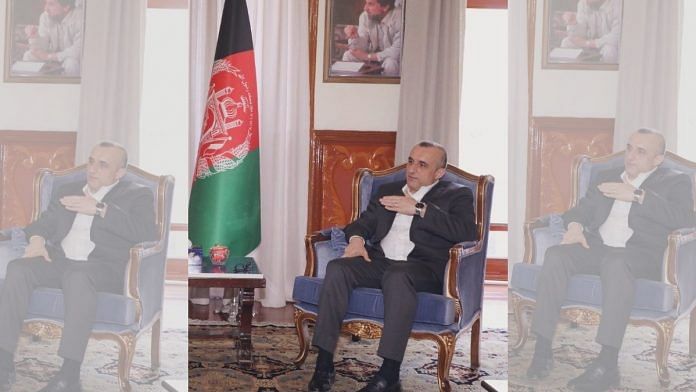New Delhi: Afghanistan’s former vice president Amrullah Saleh has called the UN deputy secretary-General Amina J. Mohammed’s proposal on the possible recognition of the Taliban ‘a cardinal sin’, adding that the “presentation of the Taliban as normal or eligible to rule a victimised country” by her is “disappointing & painful”.
This comes a week after Mohammed — while speaking at a seminar at Princeton University in the US — suggested that talks will be held on the “possible recognition” of the Taliban at the UN-hosted closed-door meeting in Doha, Qatar, between secretary-general Antonio Guterres and special envoys of various nations.
However, on 20 April, the UN clarified her remarks saying that Taliban’s international recognition is not the focus of the two-day meeting to be held at Qatar starting 1 May.
Stressing on the need for such discussions, Mohammed, on 17 April, had said: “Out of the meeting with the Secretary General, we hope to find those baby steps to put us back on the pathway to a principled recognition of the Taliban with conditions… The Taliban clearly want recognition and that is the leverage we have”.
Furthermore, while discussing the circumstances surrounding the Taliban’s takeover of Afghanistan in 2021, she stated, “If the global community could come together, we could have talked about the economy, rights and security in the region. We (UN) did have an idea that the Taliban would be held to the standards of the member states of the UN so there would be some pathway to recognition based on principles of the Charter.”
The Taliban took over Afghanistan in August 2021 and has since banned women from entering most public spaces, and shut down educational spaces for women. Most recently, the Taliban banned female employees from working for the United Nations.
Also Read: ‘I wanted to go to Oxford’. Afghan women’s dreams dashed after Taliban’s university ban
Backlash over Mohammed’s comments
Amina J. Mohammed, a British-Nigerian diplomat, is currently serving as the fifth deputy secretary-general of the United Nations. She has previously served as the Nigerian Environment minister from 2015-2016 as well as coordinated the Task Force on Gender and Education for the United Nations Millennium Project (2002-2005) among many other roles.
Her comments on Afghanistan have received immense backlash from US leaders as well as human rights activists, including Fariha Easer, who has worked as a justice sector reform specialist and has over 12 years of experience in Afghanistan.
Sharing her views on Twitter, she called for the UN to recognise the “barbarity” of its suggestion while noting, “Can you even grasp the magnitude of the suffering of those who are being systematically erased from society, denied access to education, to work or any other basic freedoms?”
She further added, “The Taliban does not deserve any recognition or legitimacy from an international body, especially not the UN. We must unite and demand that the UN uphold the highest standards of human rights and justice. We must stand firmly against the decision of recognition of a terrorist group that has caused so much misery to our country (Afghanistan).”
Apart from activists, many women have been speaking out against the remarks using #DoNotRecognizeTaliban.
#DoNotRecognizeTaliban https://t.co/wSHx2wkMr7
— ائتلاف جنبش های اعتراضی زنان افغانستان (@WomanProtesters) April 21, 2023
US Senator James Risch also criticised Mohammed’s remarks calling discussions on recognition of the Taliban as “absolutely absurd”.
The UN needs a wake-up call. Any talk of recognition of the #Taliban is absolutely absurd. This murderous regime continues to deny women the ability to work or go to school while millions of Afghans are in dire humanitarian need. https://t.co/dOp05Gn0A9
— Senate Foreign Relations Committee Ranking Member (@SenateForeign) April 19, 2023
UN clarification & Taliban stand
In response to the backlash, UN spokesperson Stephane Dujarric clarified Mohammed’s comments, stating that issues of recognition are “clearly in the hands of the Member States” based on the UN Charter.
“She was reaffirming the need for the international community to have a coordinated approach regarding Afghanistan, which includes finding common ground on the longer-term vision of the country and sending a unified message to the de facto authorities on the imperative to ensure that women have their rightful place in Afghan society”, the UN spokesperson said.
On 17 April, Taliban chief spokesman Zabihullah Mujahid told American broadcaster Voice of America (VOA) that the United Nation must “fulfil its responsibility” towards Afghanistan.
“Islamic Emirate wants the recognition process to be completed soon. It will build mutual trust with world countries and help resolve all issues that can benefit regional security and stability,” Mujahid told VOA.
In response to the Taliban’s ban on female employees working for the UN, the United Nations Development Programme (UNDP) chief Achim Steiner told The Associated Press Wednesday, “It is fair to say that where we are right now is the entire United Nations system having to take a step back and reevaluating its ability to operate there. But it’s not about negotiating fundamental principles, human rights”.
He further suggested that “human rights are non-negotiable” and that the UN will reduce its presence in the country in May if the Taliban do not abandon such bans.
(Edited by Anumeha Saxena)
Also Read: Crushed dreams, threats, marriage ‘for safety’ — what life is like for educated Afghan women



